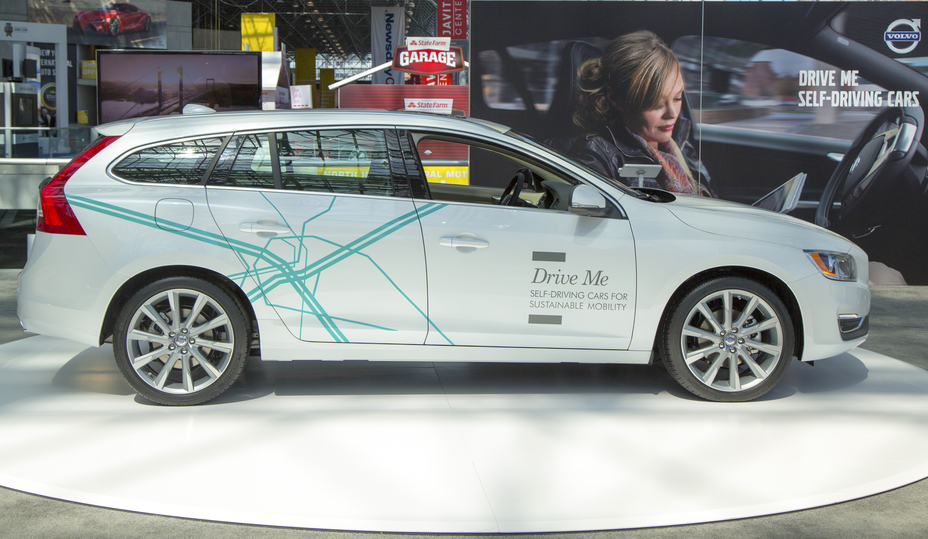From Science Fiction to Fact: Self-Driving Cars Soon to be a Reality
 Self-driving cars, something you would expect to see in the latest Sci-Fi thriller from Steven Spielberg or George Lucas, but they may be closer to a reality than you’d think. Delphi Automotive PLC is an automotive parts manufacturing company headquartered in Gillingham, Kent, UK. It is one of the world’s largest automotive parts manufacturers. So why are we telling you about a company that you’ve probably never heard of? Because they just completed a 3,400-mile drive from San Francisco to New York… driven solely in a self-driving car.
Self-driving cars, something you would expect to see in the latest Sci-Fi thriller from Steven Spielberg or George Lucas, but they may be closer to a reality than you’d think. Delphi Automotive PLC is an automotive parts manufacturing company headquartered in Gillingham, Kent, UK. It is one of the world’s largest automotive parts manufacturers. So why are we telling you about a company that you’ve probably never heard of? Because they just completed a 3,400-mile drive from San Francisco to New York… driven solely in a self-driving car.
This was not only an amazing technological feat, but it shows how rapidly engineers and software developers are working the bugs out of autonomous cars and turning the concept from science fiction to a tangible reality. While no auto company working on autonomous cars is ready to put an exact date on when these cars will be ready for the public, they do all seem to predict that the key will be regulatory and insurance matters that will be the determinant factor for release.
As it stands today, however, that bright future we once dreamed up in movies, books, and art is actually closer to our doorstep than ever before. Engineers have already been building and incorporating much of the mechanical hardware needed for self-driving vehicles into existing cars.
Items such as electric power steering, camera-based lane-keeping systems, self parking systems, radar based cruise control and even active braking systems are all part of the foundation building up to these self-driving cars. Meanwhile, software engineers have been developing the programming that synchronizes these systems all together, potentially working towards an integrated system that would be able to make the right decision in every possible traffic situation.
In the case of Delphi, they had one of their engineers behind the wheel during each leg of their test trip while the Audi they used drove itself in bumper-to-bumper L.A. traffic jams, on long stretches of two-lane highways and through light rain, high winds, and tricky construction zones. Engineers are said to later mine the data they collected and use what they learned to assist in making the automated driving feel more natural.
According to the test run, the car may actually be too precise, having driven the exact speed limit for the duration of the trip even as traffic was moving much differently. The building blocks for this concept are definitely available now from a technology perspective but now it’s just a matter of practical application.
Delphi is not alone in this though. Hot off of their recent celebration of achieving their goal of selling 1 million vehicles in China by 2020, Chevrolet also revealed a futuristic concept car here meant to showcase its technical prowess to young Chinese buyers. Recently, Volvo also introduced their self-driving concept car at the New York Auto Show.

Chevrolet calls it the FNR concept, an acronym for the brand’s “Find New Roads” theme and it is a pod-like, science-fiction inspired autonomous electric vehicle. Its “dragonfly” dual-swing doors have drawn a steady stream of onlookers at Chevy’s 38,000 square-foot stand at auto shows. The car was developed by GM’s Pan Asia Technical Automotive Center, and it was a joint venture with Chinese partner SAIC Motor. The concept shows how the American auto giant is not only globalizing but are increasingly exploring the possibilities created by autonomous technology.
The FNR has magnetic, in-wheel electric motors and is said to be able to be charged wirelessly. Equipped with sensors and a roof-mounted radar to map the route for driverless operation, the car is rumored to have the ability to be driven in either manual or self-driving mode. The self-driving mode actually allows the front seats to swivel 180 degrees to face the rear seats. Sensors are actually being developed to monitor the driver’s biometric data and switch to autonomous mode if the car detects driver fatigue.
GM seems set on reaffirming a commitment to offer electric vehicles that meet customer’s lifestyles as tech evolves. And this is all just the start of GM and Chevrolet’s efforts to be ready for the transportation needs and wants of the future. One has to wonder if GM plans to extend these vehicles outside of Asian markets and potentially bring this technology to their Ford, Buick, and Cadillac models as well.
Some time soon, perhaps in your lifetime, we will be able to put our cars on autopilot. It’s interesting to think of the conveniences afforded by such developments and it is only a matter of time before regulatory agencies and even insurance or vehicle protection agencies begin to catch up to the brave new world. We are certainly ready for a new frontier of driving, are you?
More like this
-
 Tech
TechUsing AI in the Future of Vehicle Inspections
Read MoreArtificial intelligence (AI) is everywhere at the moment. With the rise of Midjourney and ChatGPT, it’s been dominating the headlines for the last year or so, but these applications are..
-
 Tech
TechThe Future of Extended Car Warranties: Exploring the Blockchain and Smart Contracts for Claims
Read MoreTechnology has changed many aspects of people’s daily lives. Things like phonebooks and VCRs have given way to devices and systems that make accessing information quicker and more convenient. Artificial..
-
 News
NewsChatGPT May Revolutionize Automotive Infotainment and Technology
Read MoreSince the early days of the automobile, carmakers have sought to introduce ever-increasing levels of automotive technology to their offerings. General Motors gets credit for the first automatic transmission in..





Alex has worked in the automotive service industry for over 20 years. After graduating from one of the country’s top technical schools, he worked as a technician achieving a Master Technician certification. He also has experience as a service advisor and service manager. Read more about Alex.